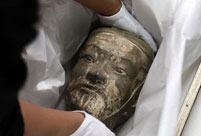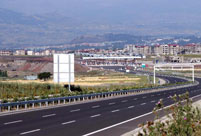 Giant Spider-Man appears in Fuzhou
Giant Spider-Man appears in Fuzhou
 Beautiful Chinese-built roads in Africa
Beautiful Chinese-built roads in Africa Sagya Monastery in Tibet
Sagya Monastery in Tibet
 Young Chinese drive consumption
Young Chinese drive consumption
 The life of a model: Not as glamorous as it seems
The life of a model: Not as glamorous as it seems
 Hello Kitty, happy 40th birthday!
Hello Kitty, happy 40th birthday!
 The Western Qing Mausoleum
The Western Qing Mausoleum
 Avant-garde approach to graduation photos
Avant-garde approach to graduation photos
 Early PLA posters, signatures of an era
Early PLA posters, signatures of an era
 First Russian Street in Tianjin open to public
First Russian Street in Tianjin open to public
ABUJA, May 10 -- Africa's economic growth has been tremendous over the past decade with seven of ten of the world's fastest-growing countries coming from the continent, according to the United Nations Sustainable Development report in 2013.
The World Bank and International Monetary Fund (IMF) both projected the continents growth to reach 5.5 percent in 2014.
In the midst of these impressive growth figures with somehow strong macroeconomic indicators, certain critical social indicators have however been missing in Africa's growth.
"The African economy has seen growth over the last decade, but it is a growth that has not created jobs," Ngozi Okonjo-Iweala, Minister for Finance for the Federal Republic of Nigeria said in Abuja, Monday ahead of the just ended World Economic Forum on Africa.
The forum, which was under the theme Forging Inclusive Growth, Creating Jobs, had more than 1,000 participants from across politics, business and civil society.
Besides, Okonjo-Iweala said the growth was also not a type that carried everybody along, describing the situation as a collective problem which needed collective solutions.
For instance, Nigeria has youth unemployment alone reaching 5 million according to the minister, with the country only able to fill the annual job needs partially, asking, "How do we get a growth that also creates jobs and provides social protection measures?"
In the case of Nigeria, she said the issue was both the unavailability of jobs, and the lack of the appropriate skills for the jobs that economic growth throws up.
"The necessity is for us is the development of skills and investment into creating jobs, while pursuing inclusiveness by putting women and girls at the center of development, with the provision of social protection measures because Nigeria cannot grow without the inclusion of girls," the minister stated.
Why is it that only a few are getting rich in Africa in spite of the reported economic development on the continent, and over 80 percent of its population are still living on less than one dollar a day? quipped Winnie Byanyima, the Executive Director, Oxfam UK.
She called for a reduction in the current level of raw material exportation by African countries to other continents, and rather focus on industrialization, in order to reduce the inequity and inequality in Africa's growth story as this could also culminate in the creation of more jobs for the youth of Africa.
"when Africa's growth translates into health and free social services for the poor, inclusive growth would have been achieved," Byanyima said during one of the side events of the World Economic Forum in Abuja.
The growth rate across Africa has been very impressive, observed Paul Kagame, President of Rwanda, wondering whether this growth has generated jobs or improved the well-being of the people.
"You cannot get growth by few companies. Not a situation where people continue to grow at the expense of others, while others lose. We are talking about equity, equality and how job creations can be achieved," Kagame stressed in his interventions during the panel discussion on "Unlocking Job creating Goals."
The Rwandan president explained that since his government knew agriculture affects many lives, it invested in the people in such a way that they were able to have food security, conceding however that incomes from agriculture were still low.
"Intra-Africa trade has huge potentials, but how much are we contributing to encourage trades among African?" Kagame asked.
To Nigerian billionaire Aliko Dangote, the issue about job creation is critical to solving the problem of armed rebellion in the region.
He faulted African countries for the low level of intra-African trade that goes on with imports rather on the ascendency.
"The intra-Africa trade, as of 2012, is actually just about 100 billion U.S. dollars only. And that is less than 50 percent of trade in West Africa. It means majority of what we consume are imported. And when you import, it means you are importing poverty and exporting job creation," Dangote remarked.
A lot of people are still left behind in Africa as the continent grows, with widening income inequality. The exclusivity still remains with access to finance, title to property, education, among others, observed Sampson Akligoh, Economist with Ghanaian Investment bank, Databank.
The biggest challenge to job creation in Africa, according to him, is access to finance, and the fact that salary levels for the middle class are so low that accumulating saving towards setting up new companies is very difficult over the youthful life of a typical middle class person.
"Angel financing is also difficult due to the closed nature of most developing countries, and general lack of trust. I think family businesses must open up, and aim to become well capitalized companies to help the unemployment situation," Akligoh said in a mailed response to Xinhua inquisitions.
He however believed governments could do a lot to induce the creation of jobs through tax incentives for the poor and low middle income earners and easing access to finance.
"We must make it easy for the poor to have title to property and be able to access finance, and public policy must give incentives for the poor to have substantial tax breaks at the beginning if they are roped into the formal sector," the economist urged.
 A free sky for music
A free sky for music Terracotta Army to the US
Terracotta Army to the US When we are young...
When we are young... Solar halo occurs in Lhasa
Solar halo occurs in Lhasa Photos give cheongsam a new life
Photos give cheongsam a new life Graduates bid farewell to campus in clown costume
Graduates bid farewell to campus in clown costume Badain Jaran Desert: Amazing curves of nature
Badain Jaran Desert: Amazing curves of nature Beautiful Chinese-built roads in Africa
Beautiful Chinese-built roads in Africa High fashion trend welcomed by costumers in Changsha
High fashion trend welcomed by costumers in Changsha The 'Chinese Dad'
The 'Chinese Dad' Chinese mountaineer's gear list
Chinese mountaineer's gear list  Newly recruited police in Hetian hold drill
Newly recruited police in Hetian hold drill  China's most luminous celebrities
China's most luminous celebrities Top 10 most expensive cars in the world
Top 10 most expensive cars in the world 'African Street' in Guangzhou
'African Street' in GuangzhouDay|Week|Month